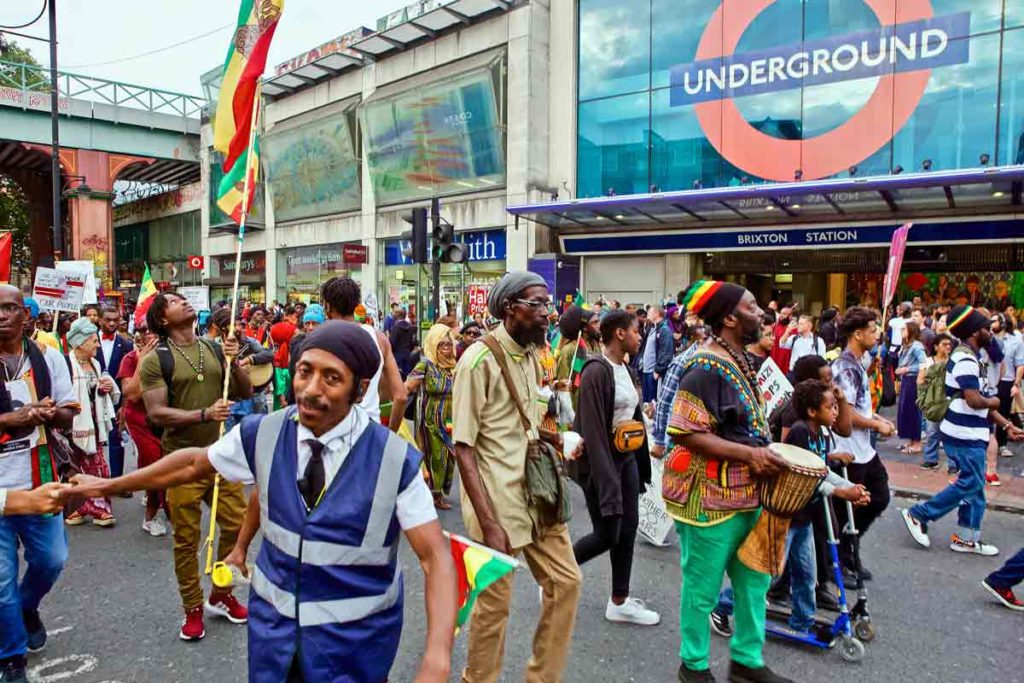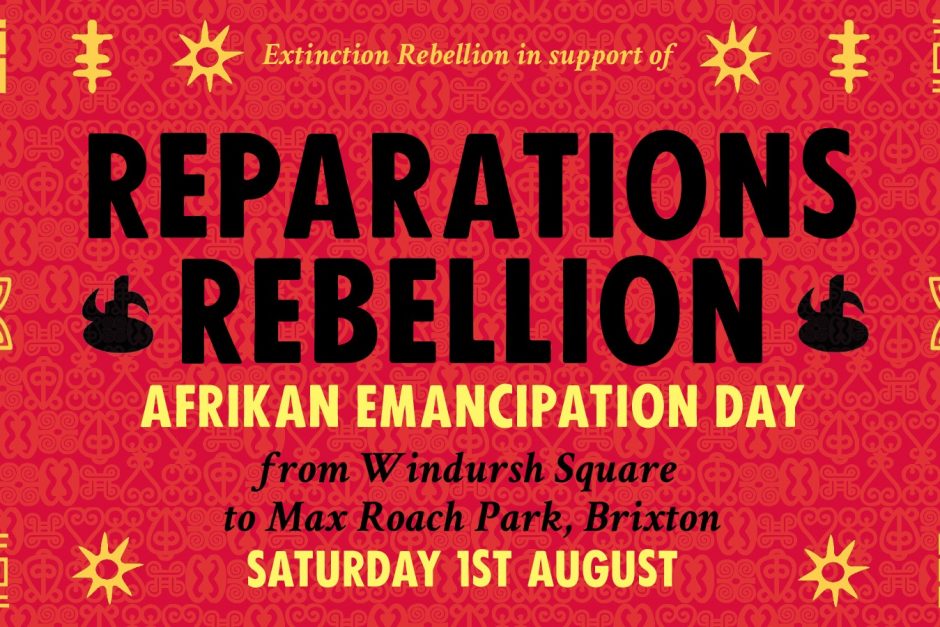Reparations Rebellion Groundings 2020 – Moving on Globally
Esther Stanford-Xosei explains the political, historical and social background to the events planned in Brixton today (1 August) – the seventh annual reparations march

PICTURE: Paul Iwala/Alamy
Brixton, London, August 1, 2020 from 9am – Every year on this day, we in the Afrikan Emancipation Day Reparations March Committee and the Stop the Maangamizi: We Charge Genocide/Ecocide Campaign co-organise the Afrikan Emancipation Day Reparations March which sees thousands of people congregate in Brixton.
This year will be different. We are instead organising the Afrikan Emancipation Day Reparations Rebellion Groundings, which will take the form of a Brixton Road lock-down, because we are not being heard in our people’s demand for the UK government to establish an All-Party Parliamentary Commission of Inquiry for Truth & Reparatory Justice, as advocated in the Stop the Maangamizi! petition.
We are sick and tired of the UK government telling us that “We do not believe reparations are the answer”, hence we have decided to be more challenging by engaging in this form of peaceful non-violent direct-action.
This 1 August marks the seventh year of commemorative protest events to mark the so-called “Emancipation Day“.
Emancipation Day is commemorated in the Caribbean and some parts of Africa, marking the passing of the 1833 Abolition of Slavery Act, which came into force on 1 August 1834.
The passing of this act, however, did very little to truly emancipate enslaved Africans; instead it legislated for compensation to be paid to British enslavers (rather than the enslaved).
This was fully implemented with the 1837 Slave Compensation Act, that compensated the enslavers to the sum of £20 million, amounting to 40% of the UK Treasury’s annual income.
This crime against humanity resulted in inter-generational social death, unjust impoverishment, dispossession and social displacement for Africans and People of Afrikan descent; who continue to be impacted by such today.
Groundings, as championed by Afrikan Guyanese scholar-activist historian, Dr Walter Rodney, are popular education and conscientisation sessions with grassroots forces for organising resistance actions towards the concrete struggle for a new society and another world.
The Afrikan Emancipation Day Reparations Rebellion Groundings, will consist of various Grounding spaces, for instance, arts and culture, community/planetary wellbeing, family, Maatubuntujamaa political economy, internationalist solidarity and women in resistance.
The theme for the Groundings is “Uniting to Stop the Maangamizi for Our Very Survival: Planet Repairs Now!”
Maangamizi is a Kiswahili term for “Afrikan Hellacaust”. The event aims to promote the necessity of stopping the genocide and ecocide of Afrikan people and our environments and the relevance of reparatory justice and environmental justice to the advancement of planet repairs solutions to the racist climate and ecological crises, disproportionately impacting peoples in Afrika and other parts of the Global South and their diaspora communities in the Global North as well as the weaponisation of pandemics such as Covid-19, anti-Black racism and its specific form Afriphobia.
We will also celebrate the decades of efforts made in and beyond Lambeth which have culminated in the historic passing of the motion initiated by the Stop the Maangamizi Campaign and Green Party – “Atonement and Reparations for the Transatlantic Traffic of Enslaved Africans” – passed by Lambeth council on 15 July 2020.
The international presidium that will preside over these Groundings includes Togbe Adza Tekpor VII (Paramount Chief of Avatime, Ghana), Dukofenokploga Nyoefe Yawa Dake (Co-Vice-Chair, Ablodedunovisiha of Ablodeduko, West Afrika), who belong to the Maatubuntumitawo Global Afrikan Family Reunion International Council; as well as Daira Elisa Quinonez, an Elder of the Palenques of Afrodescendant Communities of Resistance in Colombia.
There will also be a live link-up from the 31st annual national convention of NCOBRA (the National Coalition of Blacks for Reparations in America).
A core aspect of the Groundings, is that Brixton will be decongested to reduce air pollution and transformed into a public action-learning space featuring a number of arts-focused reparations.
This includes: the Arts and Culture Grounding space hosted by Mad Professor of Ariwa Sounds, the renowned dub/reggae label and recording studio in South London, which will feature a number of performing artists; as well as the Sankofasafarinta Internationalist Solidarity Exhibition, consisting of various sections like the Living Art Project – “I’m here because …” inviting attendees to create a response to these words in advance or add contributions on the day.
The Groundings are being supported by Rhodes Must Fall Oxford, A Tribe Named Athari, (TNA) as well as Extinction Rebellion.

Esther Stanford-Xosei is official spokesperson, Afrikan Emancipation Day Reparations March Committee’ and Coordinator General, Stop The Maangamizi; We Charge Genocide/Ecocide Campaign







One should rather regard how serious the participants in the August 1 mobilisation are to risk their health in a mass gathering. The UN council on human rights that you refer to provides little more than a talking shop and an ego platform; the USA removed itself from the forum over two years ago and the grandstanding proclamations issued by committee members lack both mandate and federal fortitude.
The corporate reparations mentioned are encouraging but go nowhere near towards addressing the ongoing problem of systemic discrimination and the continuing exploitation, illegal resource theft and military occupation of Africa. In truth, the payments authorised by Greene King and Lloyds amount to little more than fig leaves which assuage their guilt, rather than promulgate significant change. It must always be remembered that the most important aspect of reparations is the guarantee of non-repetition of past offences. Therefore, we require debt cancellations and statutory restrictions placed on foreign corporates operating unethically on the continent.
Initiatives such as the Brixton lockdown provide necessary forums for debate and enlightenment, allowing participants to return to their families, neighbourhoods, places of employment and education armed with information to share and disseminate amongst their peers.
Africa must be allowed to develop to the point where she can feed her nationals and build ecologically efficacious industries that allow her nation states to export and trade fairly in a relationship with its international partners that benefits our beautiful planet and all of its inhabitants.
Aren’t you a bit hehind the times? Progress has been made. Don’t you know about the reparations paid by Greene King and Lloyd’s of London? Or the research by UCL? Or the statement by the UN? Reparations are fast becoming an essential part of corporate governance for big companies. Why aren’t you acknowledging that and building on it? All you did today was cause yet more Covid deaths in the BAME community by holding an illegal gathering.